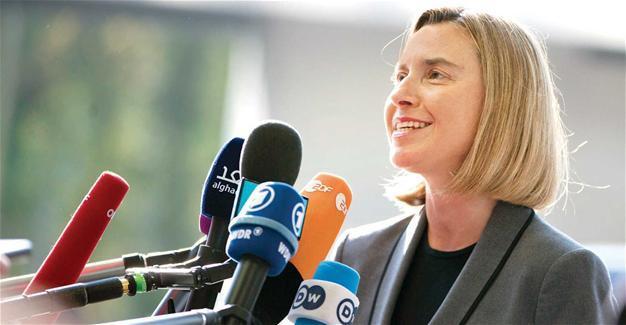EU sees no future for Assad in Syria, say foreign ministers
LUXEMBOURG
 President Bashar al-Assad has no future in post-conflict Syria but his fate is ultimately up to the Syrian people, European Union foreign ministers said April 3 in response to an apparent shift in U.S. policy.
President Bashar al-Assad has no future in post-conflict Syria but his fate is ultimately up to the Syrian people, European Union foreign ministers said April 3 in response to an apparent shift in U.S. policy.The United States and the European Union have consistently demanded al-Assad stand down in any peace deal.
But last week Washington signaled it would no longer focus on Assad’s ouster as it concentrates on the wider fight against terror groups such as the Islamic State of Iraq and the Levant (ISIL).
Asked what this meant for EU policy, bloc foreign affairs chief Federica Mogherini said she believed it “would be impossible” to return to the status quo in Syria.
After nearly seven years of war, “it seems completely unrealistic to believe that the future of Syria will be exactly the same as it used to be in the past,” Mogherini said as she arrived for an EU foreign ministers meeting in Luxembourg.
“But this is for the Syrians to decide, that is clear ... any solution that can be acceptable by all Syrians, we will support it.”
The foreign ministers later endorsed a statement which noted: “The EU recalls that there can be no lasting peace in Syria under the current regime.”
It said some 13.5 million Syrians were now in need of humanitarian assistance inside Syria while another five million had sought refuge in neighbors, such as Turkey and other regional countries.
Mogherini on April 4 co-hosts with the United Nations a two-day conference on Syria’s future in Brussels focused on the disastrous humanitarian situation in the country after a war which has claimed more than 320,000 lives.
Mogherini stressed that this was part of efforts to prepare properly for the end of the war while U.N.-sponsored peace talks in Geneva continued to search for a peace settlement and Russia and Turkey brokered talks between Damascus and the rebels on a cease-fire.
German Foreign Minister Sigmar Gabriel said he believed the changed United States position was certainly “more realistic,” as to insist that al-Assad must step down from the start would only result in deadlock.
“But there is one thing which cannot happen - that a dictator who committed horrible crimes in the region remains untouched,” Gabriel said.
The U.N. peace talks should continue with the aim of producing a “new constitution, elections and a new and democratic government,” he said.
“This cannot be abandoned or subordinated to the conflict against Islamic State [ISIL],” he added.
French Foreign Minister Jean-Marc Ayrault for his part said there had to be a genuine political transition to a new Syria.
“France does not believe for an instant that this new Syria can be led by Assad,” he said.
Meanwhile, more than $260 million was pledged in humanitarian aid for Syria following a meeting in Doha on April 2 involving the U.N. and 25 non-governmental organizations from across the region.
Qatari state media said the total number of pledges stood at $262 million and were made by participants at the meeting which comes ahead of the EU conference in Belgium.
Ahmed bin Mohammed Al-Muraikhi, the U.N. Secretary General’s Humanitarian envoy, told the Doha meeting that Syria faces a huge humanitarian crisis which requires up to $8 billion in aid for the current year.
He added that more than 13 million Syrians need humanitarian assistance, according to the Qatar News Agency.
Among the organizations at the conference was the Qatar Red Crescent, several from the Gulf Cooperation Council and charities from Lebanon, Jordan and Turkey.
This week’s Brussels conference is expected to bring together representatives from more than 70 countries and international organizations.
















